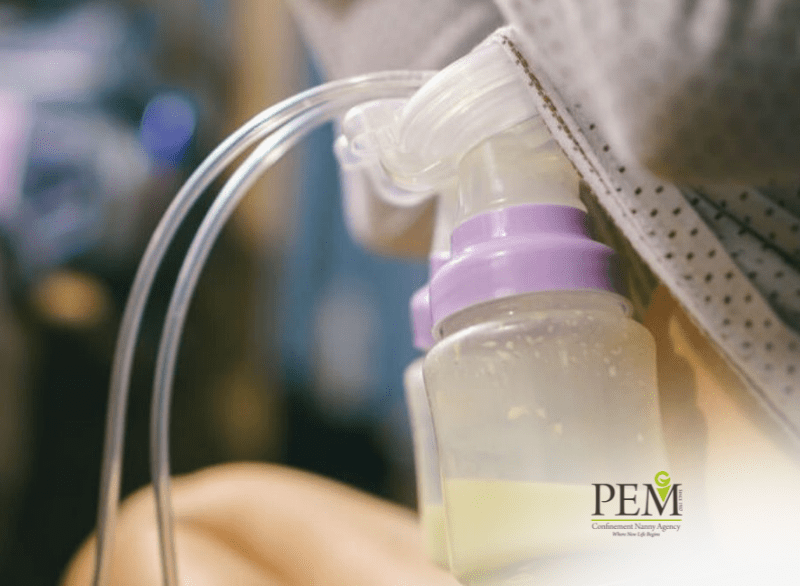[email protected] ♦ (+65) 6293 9249 ♦ Mon - Sun : 10:00AM - 7:00PM
Breastfeeding & Pumping Basics for First-Time Moms

You have heard of the wonders that breastfeeding can do for your baby, among them being breast milk having the nutrients necessary for your baby and containing antibodies that will improve your baby’s immune system, in addition to it being easy on your baby’s digestive system. As a matter of fact, it even benefits you, the mother, as it promotes weight loss, it is easy on the wallet as you do not need to purchase powder formula, and it provides a good bonding moment between mother and child.
However, breastfeeding could pose quite a challenge for a new mom as many aspects about it are learnt from experience. Contrary to popular belief that lactating comes naturally for mothers, there have been many cases where it requires extra effort to do as some mothers could face difficulties such as insufficient or no supply of breast milk or the baby not latching to the nipple.
So, how should a first-time mother go about breastfeeding and what should she do if she faces some problems? Read on to find out more.
Breastfeeding Basics
Step one to breastfeeding is of course to hold your baby. Have him or her face your bosom and make sure you are belly-to-belly, not facing different directions as this could make swallowing difficult. It is important to remember to not lean over your baby as it could bring discomfort, but to bring the baby towards you instead.
Next, to get your baby’s mouth to open wide, touch the baby’s lips with your nipple. It is a baby’s instinct to suck and latch on. So, when the baby’s mouth is opened wide enough, have it over the whole areola and not just the nipple, getting enough breast tissue to ease the baby’s sucking. Then, your baby would have started nursing.
With that said, the process might not go as smoothly as you intended. Understanding that it is completely normal to be somewhat struggling in the beginning and not be discouraged by it will be very helpful in overcoming it.
Here are a few common obstacles that new mothers face when breastfeeding for the first time.
i. Baby not latching
This could be because both mother and baby need a little more getting used to the process or simply because you’re not holding the baby correctly. You can solve this by trying out different holds to get your baby more relaxed. This may make it easier for your baby to reach your breast more comfortably. Besides that, a baby not latching on could also be because the mother’s nipples are flat or inverted. There is a simple solution to this, which is by getting nipple formers which apply a gentle pressure to push the nipple outwards.
ii. Insufficient milk supply
Many a time, mothers would think that their milk production is on the low side when that isn’t the case. Oftentimes, it is because new mothers overestimate how much their baby actually needs. But, if you notice certain changes, or lack thereof, from your baby such as little to no weight gain, decreased activeness, or minimal waste expulsion, then this could be something you need to pay attention to.
Seeing as how breastfeeding is a supply-and-demand, one way to combat low milk supply is actually by upping your nursing or pumping frequency. The more you do that, the more milk your body will produce in order to meet your baby’s demands.
iii. Breast engorgement
Engorged breasts can be very uncomfortable as they become swollen, hard, and painful due to overproduction of milk. It may even make it difficult for your baby to latch on properly. This could happen if your body still hasn’t regulated its milk production according to your baby’s needs, if your baby isn’t drinking the full supply, or if you don’t nurse frequently enough.
Massaging your breasts and applying a warm compress could alleviate the soreness and pain. Doing this softens them and brings down the swelling. You could also express the milk by hand. This is where you manually squeeze out some milk, which could help with the fullness and allow the milk to flow better during nursing.
Breast Pumping Tips

There might be times when you have to be away from your baby. Even more so now that we are in the golden age where women are able to work and many new mothers do not have the luxury of breastfeeding their baby due to a full-time job. This is where pumping breast milk comes in handy.
Some things to know before you start would be:-
- Deciding if you need a manual or electric breast pump. If you need to be pumping regularly or on the daily, an electric breast pump will be your friend. If you only need to do it on occasion, then a hand-operated one may suffice.
- Setting a schedule. Knowing when your baby feeds would come first. You could set a schedule where you nurse right before heading off to work. This way, you will have a little ways to go before you need to start your pumping journey at work, and maybe even reduce how often you do it there so you could go home and breastfeed directly.
- Knowing when to start pumping. Some new mothers wait for a few weeks before they start to wait for their bodies to establish the supply and routine for breastfeeding. On the other hand, some get a headstart early on depending on their respective scenarios, wherein some babies are born premature or have special needs.
Who to go to for assistance?
i. Get help from a professional
There are doctors, nurses, and lactation specialists who you can consult if you are unsure about how to go about breastfeeding or if you are met with bumps along the way. Especially when you have just started, which is most likely at the hospital when the nurse hands you your baby.
ii. Seek advice from your confinement nanny
A confinement nanny will not only take some load off your hands by performing her confinement nanny duties, she can also be a confidant, a friend, and an advisor. You may speak to her about breastfeeding issues you encounter and she could share secrets or know-hows on how to smoothen your nursing process, either from personal or professional experience.
Being a first-time mom can be quite hectic as having a newborn drastically changes your life, especially the first few months after giving birth – which is why it is a good idea to hire a confinement nanny during this period as you get accustomed to your motherly duties like breastfeeding. Going through a nanny agent who can assign a nanny to you from a confinement nanny agency Singapore like PEM Confinement Nanny Agency would be a step in that direction.







